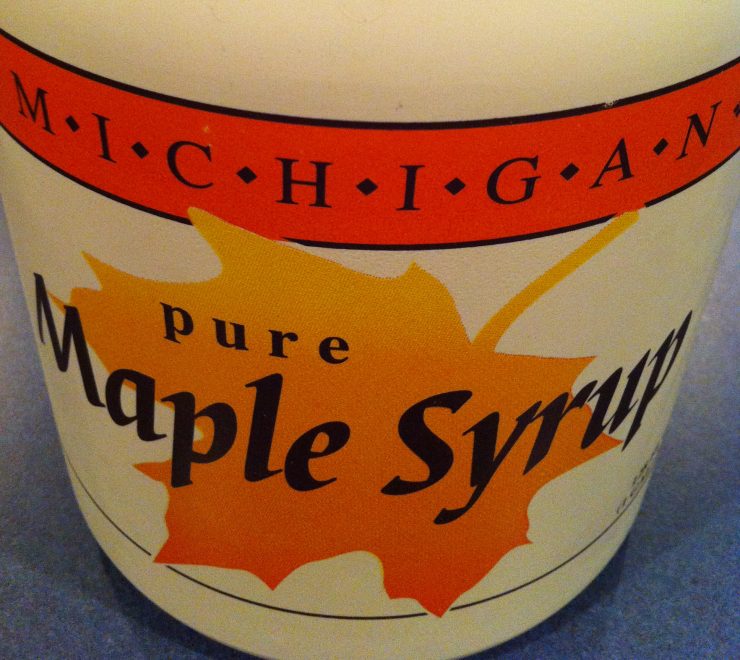
Is Maple Syrup a Safe Sweetener for Diabetics?
Below you'll find some good information from Gina, a Type I diabetic, who saw a tweet I put up a while back with a link to an article related to diabetics and maple syrup. This article caught my eye because I love using real maple syrup in recipes. Gina explains below that for her, maple syrup does crazy things to her blood sugar numbers. I'm thankful she gave the OK to share her email with you, because I know it can help a lot of people…
Hey Kelly!
First, I want to tell you that I really appreciate the work you do to help educate folks on healthy fats and better ways of eating. I am a fat-eater myself and have been implementing (albeit imperfectly) Weston Price's cooking methods at my house for several years now. Thank you for all the work you do!
I recently began following you on twitter (I'm a terribly inconsistent tweeter!) and recently spotted a tweet about maple syrup and diabetics. It said “Maple syrup may help diabetics” and included a link to an article about the very interesting and unique properties of maple syrup that may prove to have really amazing benefits to folks with all manner of diseases.
At the moment I read your tweet, I replied with several tweets in which I wanted to communicate my doubts about recommending maple syrup for diabetics. Well, the tweets just sounded really rude, which was NOT my intention, so I deleted them and thought maybe I'd just write you a quick note, instead. 🙂
After 11 years with T1 diabetes, I've had plenty of time to experiment with all manner of sugars and sugar substitutes, real and artificial. Remember that a T1 diabetic does not make any insulin at all. I have to accommodate any food I eat with a proportionate amount of insulin in the form of a shot. Therefore, I have learned a LOT about the way that foods affect our bodys' insulin requirements. I will put a quick disclaimer here about the fact that not every person's body is the same and there could, in theory, be differences in the way different people metabolize sugars.
That said, of all the sugars I have tried, Maple Syrup ranks at the top of the list as being the absolute hardest on my blood sugars. Tablespoon for Tablespoon, it is so very concentrated that it requires a much larger shot of insulin to bring my sugars back into the normal range than almost every other sugar out there. Way worse than table sugar. Way worse than turbinado sugar. Even worse than honey. This has also proven true with other T1's that I know.
This knowledge made me have a bit of a knee-jerk reaction to your *implied, not stated* recommendation that diabetics (and others who would be reading this and knowing they are “at risk” or “pre-diabetic” or gestational diabetics would infer this for themselves, also) make use of maple syrup in their diets.
If a food, (like maple syrup or pizza), is consumed by an individual whose pancreas is already having a hard time keeping up with the demands of the diet, by either, 1. making insulin, but not quite enough (this is T2 Diabetes, Gestational Diabetes or Pre-Diabetes) or 2. Not making any insulin and having to make up for any food intake with a shot (This is T1 Diabetes), then it seems like the long-term possible benefits of certain potentially healthful properties (say those found in Maple Syrup, for example) would hardly outweigh the near-term dangers of dramatically increasing the blood sugars and the insulin requirements that would necessarily follow.
That said, for healthy folks, I think Maple syrup is a wonderful thing. I think that those uniquely healthful properties found in Maple syrup are things that would greatly contribute to well-being. Maybe they would prevent diabetes – who knows? Maybe if they could separate & concentrate only the beneficial properties of Maple Syrup and put it into supplement form, without the abundant sugar, *that* would be the thing to recommend to diabetics.
I could envision a gestational diabetic mommy out there reading your tweet and thinking, “Oh! This could really help me! I'm going to start using this stuff every day!” She would find that her sugars would get much worse, not better. She would find her blood sugar numbers going through the roof and be confused about why it was happening. Then she would need to increase her insulin shots to accommodate the increase. It would kind of wreak havoc with her whole diet for a while until she figured it out! As you can see, this would be a situation of UN-health.I hope you don't think I am the diabetic police. I usually never write and correct bloggers for mistakes, cuz I make 'em all the time! 🙂 I just continued to feel like I didn't want you to have taken a position that wasn't quite on the mark for diabetics. Or maybe you read this and feel like your position is just fine. That's ok, too. I'd love to hear back from you so that I could make sure that my writing made sense.
Thank you for listening.
Blessings,
Gina
Gina, thank you again for writing to me! When I put the article up, I didn't even add commentary, I posted it on Twitter and it was just meant to be ‘food for thought'. However, I'm glad that it prompted you to follow up with all you have learned!
 Gina is a blessed wife and mother who enjoys life in the Pennsylvania countryside surrounded by her sweet family, messy gardens and poopy chickens. She tends to talk with her hands and loves to make pretty things. She is married to Mr. Wonderful and together they have founded Graham Gardens, a company that makes beautifully wholesome skincare products for naturally-minded families.
Gina is a blessed wife and mother who enjoys life in the Pennsylvania countryside surrounded by her sweet family, messy gardens and poopy chickens. She tends to talk with her hands and loves to make pretty things. She is married to Mr. Wonderful and together they have founded Graham Gardens, a company that makes beautifully wholesome skincare products for naturally-minded families.
More you might like:



JERRY FRIEDMAN says
For diabetes, consider using about 10 grams per day of Ascorbic acid. Vitamin C prevents the side effects of diabetes just as C prevents side-effects of scurvy. Diabetes and scurvy are quite similar. I have an article.
Shams M. says
this is a great post i’ve read a lot of information
but what is the best safe sweetener? i have tried to get off sugar and i just have been diagnosed a week ago and i’m watching what i’m eating very carefully but i really miss my sweet tea!
is coconut sugar safe for diabetes 2?
kitchenkop says
Any of the more natural sugars like coconut sugar are *better*, but truly, the best thing is to wean yourself almost totally off sugar. Those who have “ditched sugar” say that once they’re off it, the cravings lessen big time. OR try a little Stevia in your tea to sweeten it w/out the sugar spike!
Good luck,
Kelly
Angie W says
I second the maple syrup/extra insulin idea. I have been a Type 1 diabetic for the majority of my life and nothing shoots up my blood sugar like maple syrup. However, since I have that knowledge and know how to adjust my insulin to compensate, I still consume maple syrup (in small portions) weekly. For me, the healthy switch to maple syrup from refined sugars still outweighs the potential high blood sugars. Thanks for the extra info!
Amber says
What a lovely example these two women have set before us! How to put forth an idea, then gently/intelligently oppose it, and graciously respond to that “opposition”. Both of you are class acts in my book!!! 🙂
Anna says
Amber, I totally agree with you on this! They have certainly set forth a stellar example.
I can’t tell you how fed up I am of hearing women putting each other down, being snide, rude, hyper-critical or judgmental, and the like, and for fairly trivial things too… Distancing instead of uniting, being rude instead of helping, criticizing instead of teaching, self centered instead of considerate.
So that these two women did not fall into that trap is refreshing and incredible! It amazes me and warms my heart.
Thank you, Kelly and Gina, for your compassionate and professional exchange that holds lessons for all your readers.
Heidi says
Really interesting. I was just reading yesterday that maple syrup has a 4:1 ratio of glucose to fructose, whereas high fructose corn syrup is roughly 1:1, and honey and table sugar are both proportionally lower in glucose than maple syrup. Then reading this post today made me wonder about the specific differences in metabolizing them for someone with T1 diabetes. Looked around & found my answer (in language I could understand) on livestrong.com:
“The cells take up fructose and glucose from the bloodstream in different ways. When glucose enters the bloodstream, the pancreas releases the hormone insulin, notes Dr. Lauralee Sherwood in her book ‘Human Physiology.’ This binds to receptors on cells, which respond by taking up glucose from the bloodstream. No such hormonal requirement exists for uptake of fructose from the blood. Diabetics either fail to produce or fail to respond to insulin, meaning that glucose–but not fructose–can build up in their blood.”
In other words, a substance with a 4:1 ratio of glucose to fructose would require a bigger shot of insulin – just like Gina said!
Link: https://www.livestrong.com/article/271343-difference-between-fructose-and-glucose/#ixzz1TRJos5J3
That said, from other reading, glucose still appears to be the friendlier form of sugar for non-diabetics.
KitchenKop says
Wow, great research and very interesting!
Margaret Auld-Louie says
Although I don’t have diabetes, I find this discussion of the sugar content of maple syrup vs. nutritional content interesting due to my history. When I was in high school, I worked at a nature center where they had a maple syrup festival in March (they tapped the trees, boiled down the sap to make syrup and gave tours). I figured out how to boil down the syrup to make the maple sugar candy and the nature center sold that as well. While cooking the maple sugar candy, I ate a ton of it due to the spills and excess candy. The second year I did this, my senior year of high school, I got really sick that spring. First I had a non-descript viral infection twice in a row (the doctors couldn’t really diagnose what was wrong with me). Then I got extremely ill for a month with measles, even though I’d had measles as a toddler (this was in the days before children were vaccinated for measles). I have to wonder now what that mass influx of sugar from the maple sugar candy did to my immune system. Although it may have nutrients in it, I think the sugar content outweighed the nutrients when it came to the health effects on me. My diet was already pretty high in cookies and candy, since my mother did not restrict those in our diet at all, so maybe the maple sugar pushed my body over the edge with sugar overload.
Pavil, the Uber Noob says
Forums are a wonderful place to learn and share new stuff. Happy to see that the concept is working.
Good job, Kitchen Kop.
Ciao, Pavil
Gina says
Hey Kelly,
Thanks for being willing to look at both sides and being so gracious with my response to you. As others have said, it adds legitimacy to your work. You’re doing a great job!
I hope this article can help others who have blood sugar issues. Though I don’t have everything figured out, I sure have been around enough stuff to have some opinions – as you can see!!
Gina
ValerieH says
This reminds me of Jimmy Moore’s n=1 experiments. I want to know how kombucha, water kefir and milk kefir affect blood sugar.
Gina says
ValerieH,
My personal experiences with Kombucha leave me feeling that, like maple syrup, the benefits do not outweigh the negative effects on blood sugars. Particularly the homemade versions, which, even if allowed to ferment well past the recommended days, still contain enough sugar to be only slightly less carbs than an equivalent glass of juice. (That’s a lot!) The problem with homemade Kombucha is the variability of each batch – you can never really be totally sure what the sugar content is in the end. If you have sugar issues, I recommend purchasing commercially made, bottled Kombucha that has the least amount of carbohydrates listed in the nutrition facts. Then, you’re getting the benefits without too much sugar and, more importantly, you know *how much* sugar you really are ingesting.
I hope this helps.
Katie says
I’m also a type 1 diabetic and my experience has been pretty much the same as Gina’s with maple syrup and kombucha.
Regarding kombucha — I *love* the stuff and have made lots of it, but — like Gina said — because the sugar content can’t be measured without some kind of lab, every batch becomes a “blood sugar experiment” for a diabetic. I thought a refractometer would work, but because there’s other “stuff” (scoby stuff) in the kombucha, it can’t give an accurate measurement.
I have found that I can drink G.T.’s kombucha in measured amounts (I can do about 1 cup in a day). To my knowledge, G.T.’s has the lowest sugar content per serving among retail kombucha products.
Also, I’ve had great results with milk kefir. Basically, I use the same carb count (for insulin purposes) that I would for yogurt. I haven’t tried water kefir because, from what I’ve read, it sounds very similar to kombucha in how much sugar is left after “brewing”. Too variable.
Tammy R. says
I haven’t had to deal with diabetes myself but far too many family members do have it and I’ve learned a lot over the last few years regarding diabetes. One thing that I recently learned was the use of whole food chromium for diabetics. It is an essential nutrient that has been stripped from our food supply. If anyone wants to learn more about it, a good place to start is https://notadoc.org/node/84 I think. NotaDoc has tons of research on the use of whole food chromium.
Great article, Gina and Kelly. Just thought I’d throw this out there for anyone dealing with diabetes.
Peggy says
This post is a perfect example of doing it right. Gina, you have gone to great lengths to find out what works and doesn’t work for you, not just accepted conventional wisdom or media hype. Kelly, you’ve openly shared both an informative article and an opposing viewpoint.
Transparent reporting like this is putting powerful weapons in the hands of citizens who are fed up with the drivel and endless regurgitation of “facts” on the web. I applaud you both.
susan v. says
thanks so much for this! i’ve been “pre-diabetic” on and off for a number of years so i’m always interested to hear how various natural sugars affect blood sugar. currently i use small amounts of maple syrup when i make salad dressing, and occasionally mix it with yogurt.
some day i’d like to see a study done on all of the various natural sugars (coconut sugar especially) on how they affect blood sugar. i know it can be individual. i should be more diligent about testing my blood sugar so i could do my own study!
Sue E. says
Kelly,
It takes a lot for a person to be humble enough to post a contradiction to
something he or she published. I have always thought you are the type of person who is open to the other side’s point-of-view, and in this case, it is an important point!
Blessings to you and all you do!
Sue E.
Gina says
I totally agree, Sue! Kelly does a great job, doesn’t she?